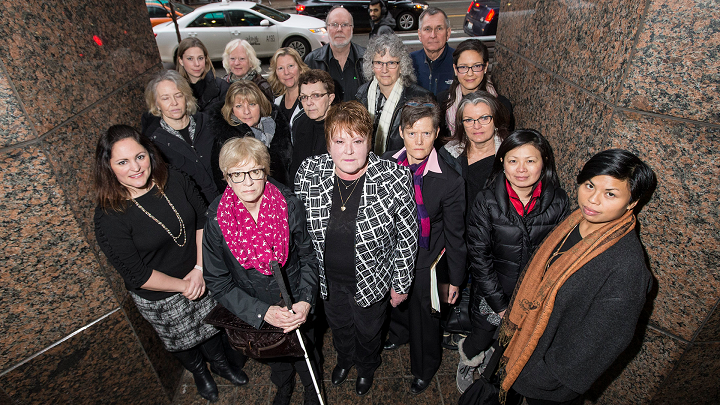Dozens of civilian employees will have their complaint heard this week at the Human Rights Tribunal of Ontario as they accuse the Ontario Provincial Police of systemic discrimination.

Eighty-four predominately female civilian managers and specialists who work for the OPP claim they are victims of gender-based discrimination and are paid significantly less – on average 42 per cent less – than uniformed officer managers who are predominately male, even though they are doing the same work.
“The pay discrepancy in a number of situations is anywhere from [a] $30,000 to $40,000 to $50,000 difference,” OPP human resources coordinator and team lead Amanda Weaver told Global News.
To address their concerns, the group created the Civilian Association of Managers and Specialists (CAMS). Members work in human resources, information technology, accounting and communications.
They claim they are being paid “significantly lower salaries,” have “reduced benefits” and pensions and “restricted access to training and promotions.”
They want to be clear that they are not comparing themselves to frontline officers but to officers who finished their “road time” and are now in managerial roles similar to CAMS members.
The OPP has denied the allegations detailed in the application submitted by CAMS to the Human Rights Tribunal, adding the civilian employees’ salaries are set by the province and are in line with other Ontario Public Service employees.
In addition, the OPP explains there are differences. All OPP officers, including commissioned officers, must keep their training up-to-date and can be called back into action at any time.
“As per our mandate of the Police Services Act … we’re mandated to get our annual training every year to be fully operational to be able to respond to policing incidents of all sorts at any time,” OPP Staff Sgt. Carolle Dionne told Global News.
Outdated attitudes and gender discrimination
Lee-Anne McFarlane has worked for the OPP for 11 years, and she has become increasingly frustrated with what she sees as a pay gap in which female civilian managers feel undervalued.
“Our argument is definitely that it’s predominantly women, and it’s because we’re women that we’re not recognized in the same way that the commissioned officers are and not paid the same,” McFarlane told Global News.
What also frustrates civilian managers is they say they often have more job related experience and education and often have to train the uniformed officer managers.
The women say the pay discrepancy has contributed to a male-dominated culture with outdated attitudes and examples of gender discrimination in the workplace.
In meetings with her equal counterparts, Weaver said male colleagues would specifically ask her to perform secretarial duties – ordering coffee, making phone calls and taking minutes.
“It’s ingrained. It’s not always sort of right in our faces,” said Weaver.
At a social event last year during the annual general meeting of the Ontario Association of Chiefs of Police, Weaver said she was “volunteered“ to participate in a game known as the “Bavarian handshake,” also known as the Oktoberfest handshake, in front of her colleagues.
Weaver and another female participant stood on either side of a male actor dressed in lederhosen. Weaver says they were then asked to shake hands by reaching through a pouch in front of the man’s pants.
Despite her objections, Weaver said she felt unable to back out of the game.
“Before you know it, it happens within seconds. And it happens, and it’s over,” she said.
“I’m embarrassed by it,” Weaver added.
The OPP told Global News they cannot comment on this complaint because it’s before the tribunal.
Zero tolerance policy
Dionne said the OPP has a zero tolerance policy when it comes to harassment and discrimination, and all complaints are “thoroughly reviewed.”
“We want everybody to feel that they’re treated equally with respect,” Dionne told Global News.
Global News asked the OPP for the number of harassment cases, and they provided it.
According to the OPP, it received 126 filed claims of misconduct, discrimination, and harassment in 2016. That year, the OPP had more than 9,000 employees – civilian and uniformed.
Of those 126 claims filed, 59 resulted in disciplinary action, training, or a voluntary resolution process such as formal mediation.
Excluded from collective bargaining
The OPP does not recognize CAMS as an official association for negotiation purposes.
They say the civilian managers are “legislatively excluded from collective bargaining due to their professional duties and responsibilities.”
The women hope this will change so they can fight for better compensation.
The result is an ever-widening pay gap, according to CAMS. They provided an example comparing a civilian manager’s salary with that of a commissioned officer doing the same work.
McFarlane and Weaver say it goes back to a “me too” clause written into an agreement 28 years ago.
Beginning in June 1990, an agreement reached with the province outlines that salary increases for officers moving to desk jobs are tied to negotiated increases for front-line officers.
“[T]he salaries of commissioned officers will reflect the same annual percentage increase as granted to members of the Ontario Provincial Police Association through the collection bargaining process,” the agreement reads.
Civilian managers were not included in this arrangement, and no similar agreement was extended to them by the OPP.
By 2007, civilian managers were paid about 13 per cent less than the male senior officers, according to CAMS.
In essence, the 1990 agreement clause ensures that uniformed senior officers who leave the frontlines to accept managerial office jobs still receive the same increases as officers with boots on the ground.
This policy is not shared by the RCMP.
Different job requirements
The OPP maintains that civilian managers and commissioned officers are paid differently because of a difference in job responsibilities, and civilian salaries are decided by the province.
Police officer managers are required to keep up to date with firearms training, since they can be deployed to the front lines for “major incidents” such as the Pan-Am Games in 2015 and the G8 and G20 summits in 2010.
READ MORE: Toronto’s 2015 Pan Am Games security cost jumps to $239 million
Some uniformed officer managers are also required to be “on-call” for specific programs including the Criminal Investigations Bureau, which investigates murders, abductions and serious assaults.
The same level of training is not required of civilian managers doing the same office work since they would not be expected to perform policing duties in urgent situations.

WATCH ABOVE: OPP civilian manager Amanda Weaver shares her frustration over being paid less than male uniformed managers she says do the same work.
The current submission to the Human Rights Tribunal of Ontario is not the first time CAMS has raised concerns over pay equity. They filed a similar complaint with the Pay Equity Office in March 2013, which was denied.
CAMS pursued the complaint and filed another application in December 2015 – this time through the Human Rights Tribunal of Ontario. The hearing began Jan. 23 and is scheduled to continue on June 14.
“It isn’t just about bumping up salaries, but it’s recognition and respect and value and equal pay for equal work,” said Weaver.









Comments